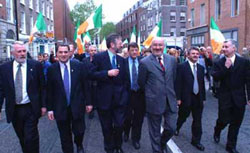 |
Irisch
Republikanische Solidarität
|
 |
Govts press ahead with Assembly recall plan
Sinn Fein has told Tony Blair that under no circumstances will it take
part in a powerless 'shadow' assembly in Belfast or its committees.
Chief negotiator Martin McGuinness said after talks in Downing Street
on Monday that his party was prepared to go into government with Ian
Paisley tomorrow morning but was "not prepared to go into limbo".
As British Prime Minister Blair and 26-County Taoiseach Bertie Ahern
prepare to unveil plans for restoring some form of talks body in Armagh
on Thursday, it is now clear that Sinn Fein will refuse to take part in
a scrutiny committee system at Stormont.
Sinn Fein's Pat Doherty warned that creating "Mickey Mouse work"
for a
shadow assembly with no real powers is "not the way forward. It would
be a costly, undemocratic farce."
NEW RECIPE
The British and Irish leaders are expected to advocate a two-phase
approach to returning some powers from London to Belfast after a
four-year hiatus.
It is believed the North's 108 Assembly members will be recalled in May
and given six weeks to form a power-sharing executive featuring the DUP
and Sinn Fein.
If, as expected, that proves impossible, the British government is to
introduce new legislation changing the rules which govern the Assembly
and which will park the body through the combustible summer marching
season.
The Assembly would be recalled in September and given what the parties
believe will be a November 24 "absolute deadline" to set up
the
executive.
It is possible that in the interim, Assembly members would be given a
"programme of work" at committee level.
A Sinn Fein delegation, including Gerry Adams, Mr McGuinness and Gerry
Kelly travelled to London for discussions with Mr Blair on Monday.
Mid-Ulster MP Mr McGuinness said: "Our message to the prime minister
is
very simple... to effectively lift suspension and restore the political
institutions.
"It is our view that the first and sole task of any convened assembly
is the formation of a government under the terms of the Good Friday
Agreement.
"And if the DUP are not prepared to cooperate in that endeavour then
the two governments effectively have to move on.
"The DUP demand for an assembly with scrutiny committees is totally
unacceptable. It is seen by us as an attempt by the DUP to return to
unionist domination. We will not consent to such an arrangement."
Mr McGuinness said both governments had to stick faithfully by the
terms of the Good Friday Agreement and decisively move the process on.
Specifically, Mr McGuinness made clear Sinn Fein's view that new
British legislation to permit the Assembly to survive without an
Executive beyond the six weeks currently defined in statute - and
Assembly committees scrutinising the work of direct rule ministers -
would fall "outside the terms of the Good Friday accord".
Such proposals were "absolutely unacceptable to Sinn Fein" as
the
largest nationalist party in the North and it would not give its
consent.
DUP leader Ian Paisley, who celebrates his 80th birthday on Thursday,
also was unhappy. He said he did not believe a multi-party executive
could be formed at Stormont and said any attempt to do so should be
abandoned.
"I think that to say that they are going to call the Assembly together
to try and get the executive set up is absolutely nonsense," he said.
"They can't do that. It is not going to happen because the foundation
for such a decision is not even laid.
"The foundation, of course, must be the end of terrorism and must
be
that this is on a solid democratic foundation.
"Now they haven't done that. So that is not going to work."
SDLP leader Mark Durkan last night also warned the governments against
trying to rewrite key aspects of the Good Friday Agreement to appease
the DUP.
He warned the DUP would settle only for being able to declare the
agreement a total write-off.
--------------------------------------------------------------------------
>>>>>> Movement on demilitarisation welcomed
Republicans have welcomed action on the promised demolition of five
remaining British army spy posts in south Armagh, which began suddenly
this week.
On Monday, a number of British RAF helicopters helped remove sections
of the spy posts which have been at the centre of a campaign to have
them removed by border residents for over two decades.
The mountain top posts at Camlough Mountain, Jonesborough Hill and
Crotlieve Hill were the site of unusual activity. A number of Royal Air
Force helicopters, including a Chinook, helped remove sections of the
spy posts which have been at the centre of a campaign to have them
removed by border residents for two decades.
26-County foreign affairs minister Dermot Ahern was on hand to monitor
the activity from a vantage point in County Louth in what was seen as
a
confidence-boosting measure ahead of developments in the peace process.
"The dismantling of the watchtowers on Camlough Mountain, Jonesborough
Hill and Crotlieve is yet another tangible demonstration of the
transformed security situation in Northern Ireland, and of the benefits
it brings to everyone. For years these installations dominated the
landscape of south Armagh," said Ahern.
"Their removal, as part of an ongoing process of security
normalisation, is an important step in giving a fresh start to these
communities in moving away from the shadow of conflict and towards an
open and prosperous future.
"Security normalisation is a key goal of the Irish government and
we
welcome this positive move. I look forward to the continuing
implementation of this demilitarisation programme which is due to be
completed by July 2007."
It was reported that some electronic monitoring equipment would be
carried on a mast at one site, although locals expressed confidence
that such equipment could not be maintained in the strongly republican
area.
MP for the area Conor Murphy said local people were relieved the spy
posts were being removed.
"There was frustration that it was taking so long, that the British
government or military were dragging their feet on the issue. But
people are happy to see it happening now."
M. Murphy said that local people also needed to be assured that the
British Army would bring an end to all of their spying on local homes
and businesses.
Speaking from the area, Mr Murphy said: Sinn Fein had actively sought
the removal of Britain's war machine from South Armagh and right across
the Six Counties.
@This has been a crucial element of our discussions with the British
Government over this past number of years. Consistent pressure from
Sinn Fein has ensured movement on this issue.
"However, there is considerable anger and frustration at the slow
pace
of movement regarding demilitarization.
"The people of South Armagh need to know that in removing the Jonesboro
watchtower, there is not a correlating increase in covert spying
operations. In February of this year, documentation was discovered that
the British Army was continuing to spy on local homes and the Dromintee
GAA club. Actions such as these only serve to increase local anger.
"I am calling for the completion of this process as speedily as
possible and the lands taken from local communities to be returned to
them forthwith."
Letzte Änderung:
09-April-06